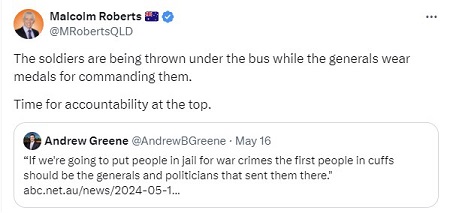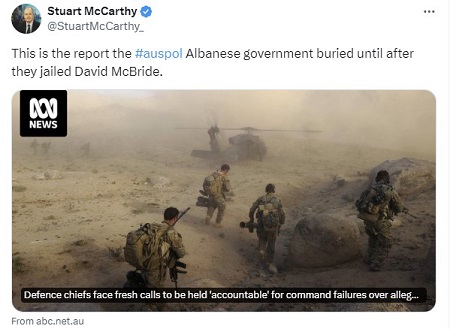21 May—The Albanese government suppressed an expert report for more than six months which echoes whistleblower David McBride’s demand that top military brass be held accountable for war crimes committed in Afghanistan on their watch, lest it make McBride’s sham trial and pre-ordained conviction an even more obvious travesty of justice than it already was.
Though it unfortunately accepts the implausible finding of the 2020 Afghanistan Inquiry Report that senior officers did not knowingly cover up war crimes and thus ought not share criminal liability,1 the final report of the Afghanistan Inquiry Implementation Oversight Panel, led by former Inspector-General of Intelligence and Security (IGIS) Dr Vivienne Thom, does demand “command accountability” both from the Defence organisation generally and from such individual officers as may in future be deemed appropriate. Its reasons for doing so are entirely consistent with McBride’s allegations, and confirm the existence of the institutional corruption in Defence that motivated him to blow the whistle—first through proper internal channels and only thereafter, when his complaints were peremptorily ignored, to the public via ABC News. Not only that, but the Panel insists that imposing such accountability is an essential prerequisite to rebuilding trust in Defence and in Government among both the general public and the personnel of the Australian Defence Force (ADF) itself; which is to say, exactly the “public interest” in whose service McBride made his disclosures, but which the court ruled he could not invoke as a defence. Yet despite having received the report on 8 November 2023 with a cover letter from the Panel stating that it “[had] been advised by Defence that there is no need or justification for this report to be classified” (emphasis added), Defence Minister Richard Marles sat on the report for six months and one week before finally releasing it, after a formal request from Queensland One Nation Senator Malcolm Roberts, on the night of 14 May—several hours after McBride had been sentenced to almost six years in prison for disobeying “lawful orders” to cover up war crimes.
As its name suggests, the Oversight Panel was instituted in November 2020 by then-Defence Minister Sen. Linda Reynolds to supervise the implementation of the reforms recommended by the four-year-long inquiry conducted for the Office of the Inspector-General of the Australian Defence Force (IGADF) by NSW Supreme Court judge and Army Reserve Major-General Paul Brereton, into what the Panel report calls “rumours of serious misconduct which potentially included war crimes by Australia’s Special Forces in Afghanistan” in 2005-16. The Brereton Inquiry, as it came to be known, vindicated the allegations raised by McBride, and separately by former ADF signals intelligence officer Braden Chapman in March 2020,2 that members of the Special Air Service Regiment (SAS) attached to the Special Operations Task Group (SOTG) in Afghanistan had committed and then covered up war crimes.
Brereton Inquiry inadequate
Brereton found that out of the hundreds of allegations over many years, there was “credible information of 23 incidents” involving the murder of a total of 39 civilians and surrendered and/or incapacitated enemy combatants, in which a total 25 ADF personnel “were perpetrators, either as principals or accessories, some of them on a single occasion and a few on multiple occasions”. He repeatedly insisted, however, that the brass knew nothing about it. “While … commanders at troop, squadron and [SOTG] level must bear some responsibility for the events that happened ‘on their watch’”, he wrote, “the criminal behaviour of a few was commenced, committed, continued and concealed at the patrol commander level, that is, at corporal or sergeant level. … The Inquiry has found no evidence that there was knowledge of, or reckless indifference to, the commission of war crimes, on the part of commanders at troop/ platoon, squadron/company or Task Group Headquarters level, let alone at higher levels such as Commander Joint Task Force 633, Joint Operations Command, or Australian Defence Headquarters. Nor is the Inquiry of the view that there was any failure at any of those levels to take reasonable and practical steps that would have prevented or detected the commission of war crimes.”
The Oversight Panel begs to differ. “Looking through a criminal lens”, wrote Thom and her colleagues, former Secretary of the Attorney-General’s Department Robert Cornall and esteemed law and defence academic Prof. Rufus Black, the focus on the patrol commander level “is appropriate. Looking through an organisational lens, the assessment of accountability and responsibility starts at the top. More senior officers have to take some level of responsibility for what goes wrong in their organisation or at least for any circumstances or policies that permitted or facilitated it.”
The problem, they suggest, is that Brereton’s inquiry was too narrowly focused in the first place. (Which, we might add, was surely no accident.) “The scope of the IGADF Inquiry, consistent with the functions of the IGADF and the terms of reference for the Inquiry and its reporting obligations”, the report notes, “was such that the highest levels of Defence leadership at the relevant times were not required to give evidence to the Inquiry and were not included in the Inquiry’s attribution of accountability.” (Emphasis added.) In light of which, they suggest, Brereton’s assertion that “But for a small number of patrol commanders, and their protégés, [the systematic commission and cover-up of war crimes] would not have been thought of, it would not have begun, it would not have continued, and it would have been discovered” was therefore something of a foregone conclusion: “That broad-brush dismissal of senior-level consideration about the possibility of war crimes also dismisses the possibility of any more senior level accountability”, they write. Again, this was presumably the point of the exercise, given the then-Chief of Army and now Chief of the Defence Force (CDF) Gen. Angus Campbell, who commissioned the Brereton Inquiry was himself among those “more senior levels” in the Afghanistan operation when the aforementioned nastiness was all going on; as for that matter was then-CDF, now Governor-General David Hurley, whom McBride has described as being personally implicated in the cover-up by the evidence he (McBride) supplied to the ABC, but which was never published.
Be that as it may, the Panel warns that the brass’s dodging of blame has proven counterproductive, in that it has had severe and ongoing effects on the morale of the Special Forces, as well as on public trust in the ADF more generally. “The exclusion of Defence’s most senior officers has attracted public criticism and caused continuing resentment and anger amongst Special Forces veterans, soldiers and their families”, they report, given that most—as McBride has emphasised—served with distinction in Afghanistan, despite increasingly restrictive and nonsensical rules of engagement, only now to have their reputations tarnished by the actions of a protected few, which their secrecy obligations prevent them from discussing lest they too wind up in jail. “This criticism has been expressed forcefully and repeatedly to the Panel by Defence members of all ranks on visits to Campbell and Holsworthy Barracks [the home bases respectively of the SAS, and the Special Operations Engineers and 2 Commando regiments] throughout the period since the Afghanistan Inquiry Report was handed down.” And unless and until the ADF at least “[accepts] organisational responsibility and accountability for part of what when wrong in Afghanistan”, that anger, resentment and distrust “is likely to last for a very long time”.
Throw the book at ’em
For all these and other reasons, the Oversight Panel insists that formally finalising the response to the Brereton Report is “a very important phase in Defence reform but [must] not [be] the end of it”. In its recommendations, under the heading “Top-down allocation of accountability and responsibility”, the Panel declares that it “did not agree with the Brereton Inquiry’s view that some accountability and responsibility could not fall on the most senior officers and it suggested that issue should be the subject of further consideration”, but offers no firm suggestions as to how accountability should be imposed.
Senator Roberts, by contrast, echoing David McBride, offered one very firm suggestion indeed: throw the lot of them in jail. “The senior leadership of Defence is avoiding accountability, and must face accountability, for crimes that are alleged to have happened under their watch”, he told the ABC on 16 May. “If we’re going to put people in jail for war crimes the first people in cuffs should be the generals and politicians that sent them there.” Hear, hear. In the meantime McBride, from the cell where he will spend at least the next two-and-one-quarter years (pending appeal) as a result of his rigged trial, can take heart from the knowledge that his battle to “put the system on trial” is one he has already won, and continues to win, as Defence and the Government’s every attempt to perpetuate the cover-up only adds to its own indictment in the court of public opinion.
Footnotes:
1. “Afghanistan war crimes report absolves the main culprits”, AAS, 25 Nov. 2020.
2. “Afghanistan war crimes demand public inquiry, re-think of alliances”, AAS, 8 April 2020.
By Richard Bardon, Australian Alert Service, 22 May 2024








